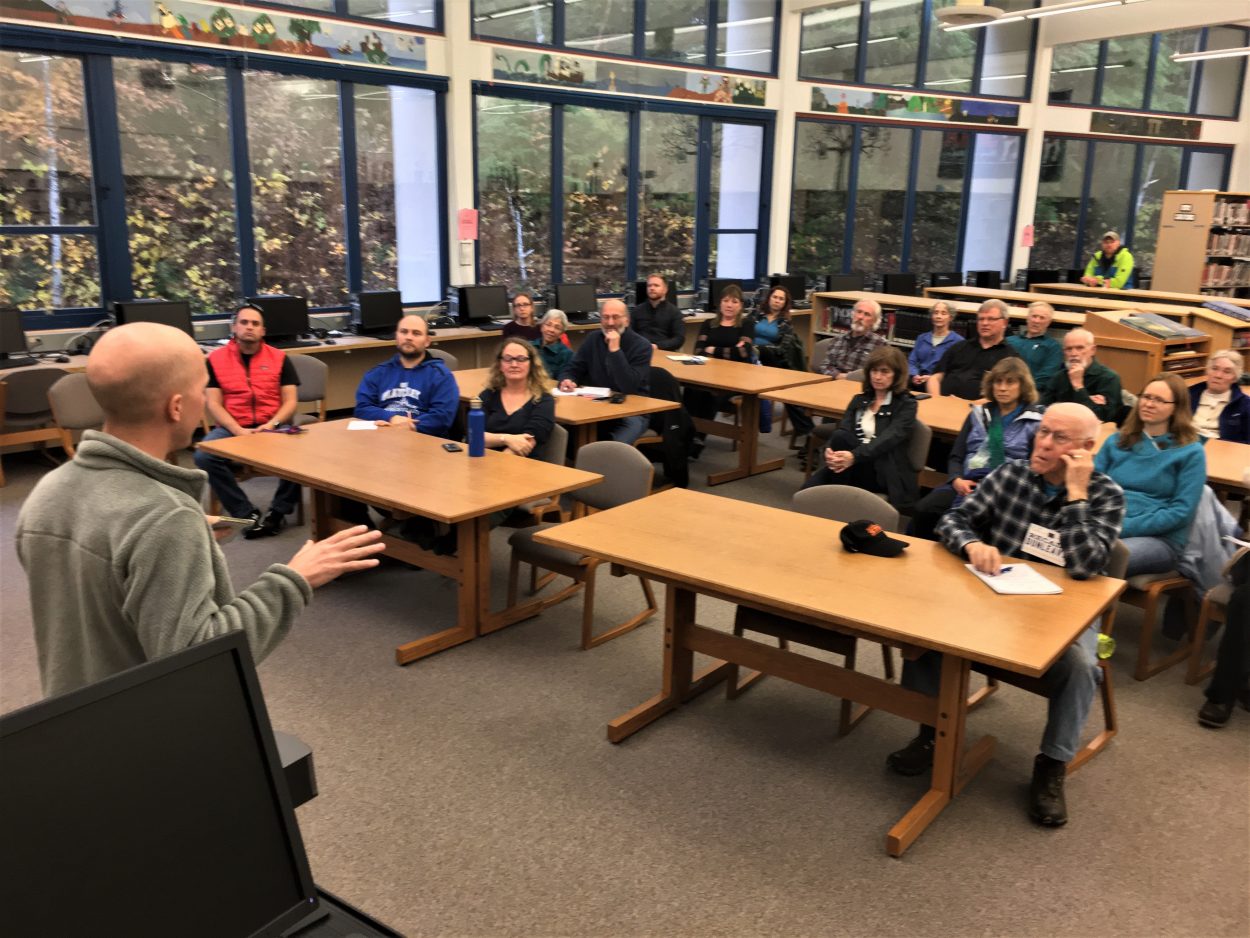
The effort to recall Alaska Gov. Mike Dunleavy may have softened some of his hardest edges when it comes to budget-cutting — but not all of them.
In a recent town hall meeting at Sitka High School (10-23-19), Rep. Jonathan Kreiss-Tomkins told a gathering of teachers, parents, and other residents that education funding was especially at risk.
Kreiss-Tomkins stood before this same crowd a little less than a year ago and told them to brace for a state budget driven by the very narrow political ideology of the governor: To balance state expenses against income, and pay every resident a $3,000 dividend from the Permanent Fund.
Except for the large dividend check, everything Kreiss-Tomkins foretold came true: Draconian cuts to state ferries, the University system, the Pioneer Homes, and many government departments, and the wholesale elimination of other programs like statewide public broadcasting.
At this most recent town hall meeting, Kreiss-Tomkins tried to clear the smoke of all those budgetary fires, and demonstrate that the governor’s strategy was disingenuous.
“It is basically mathematically impossible to balance the state of Alaska operating budget — even if you have no regard for impacts on society for what those cuts will do — to balance the budget strictly through cuts, and not use Permanent Fund revenues,” Kreiss-Tomkins asserted.
Kreiss-Tomkins says that Gov. Dunleavy’s original budget (proposed in February 2019) — which provoked unprecedented concern even among Republican allies — would have only gone about halfway toward closing Alaska’s deficit.
He believes that Alaskans lost sight of this fact, as they rallied to protect the programs most important to them.
“It’s really frustrating from my perspective that Alaska is being torn apart based on a vision for the state that is so disingenuous, and so mathematically impossible,” he said.
Although the Legislature managed to restore what it considered to be a more equitable budget, the governor further antagonized people by using his veto power to undo some of that work. The vetoes fueled a backlash, and opponents of the governor mounted a recall campaign that collected far more signatures than needed, at an unprecedented rate.
Kreiss-Tomkins said that the recall effort has made a difference.
“I would say that the recall process was an incredibly powerful political behavior modification tool, and that it has the strong potential to continue to be that,” Kreiss-Tomkins observed.
Gov. Dunleavy has since replaced his chief of staff, Tuckerman Babcock, with former state senator Ben Stevens, son of former US senator Ted Stevens. The governor also dismissed the director of the state Office of Management & Budget, Donna Arduin, who implemented his budget strategy.
But Kreiss-Tomkins’ optimism doesn’t go much further. He’s especially worried that the governor again will turn his sights on the state education budget.
“It is on the table, like a big hunk of meat, and there’s a butcher’s knife,” Kreiss-Tomkins said. “In terms of budget cuts, it’s very relevant, and we all should know that and be ready: K-12 education funding in Alaska (the base student allocation, or BSA) is $1.28 billion; the state’s operating budget is $4.1 billion (after the legislature’s cuts and the governor’s vetoes) — so it’s a big chunk of the operating budget. Remember, last year the governor proposed cutting K-12 education by 25-percent. He couldn’t do it, because we forward-funded. But that aura of protection is gone now. This coming fiscal year there’s no protection. Every dollar of that $1.28 billion is vetoable.”
Kreiss-Tomkins last April introduced a bill (HJR 15) that would change the threshold to override a governor’s veto from a three-quarters majority of the legislature, to two thirds — but the bill has yet to get any traction. He suggested that the framers of the Alaska constitution intentionally balanced the extraordinary veto power of Alaska’s governor with the extraordinary power of the state’s citizens to recall him.
“That thing is for real,” said Kreiss-Tomkins. “It is an existential threat to this governor. And I can speak to that process because I think it is politically relevant. This governor may not be the governor 12 months from now, and he recognizes that.”
Kreiss-Tomkins told the crowd that much more would be known about the governor’s intentions toward education, when he releases his preliminary budget in December.






























